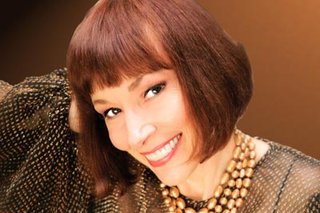Cabaret performer Karen Akers is a class act. Playful and yet regal, she is no diva. There is an intimacy and an affection when she sings, as well as heartfelt emotion. Akers has performed on Broadway — she was nominated for a Tony Award for her role in “Nine” — but she is arguably at her best in her one-woman shows. She will present her latest act, “Time Flies,” at the Prince Music Theater April 30-May 3. The show features classic and contemporary songs showcasing her alto’s vocal and emotional range.
PGN: Karen, time flies, indeed! It’s been — gasp! — two decades since we spoke. You were performing at Odette’s in New Hope. But let’s not discuss the past. What can you tell me about your new show? KA: I’m still making changes and fussing with the show. I love the songs I am doing, one of which — “Those Were the Days” by Gene Raskin — I dedicate to the piano bar at Odette’s. It was originally a Russian song. I have sung parts of it in Russian, but I don’t in this show.
PGN: “Time Flies” stems from the “American Songbook” series at Lincoln Center. Is there something specific — a genre, a composer, a lyricist — that you just gravitate to? KA: Oh honey, it can be so many different things. I’ve changed this particular collection of songs since I did it at Lincoln Center. I’ve replaced four to five songs with four to five songs I love more. I’m still opening with a Shel Silverstein song. It’s fun and not something people would expect me to sing, and we continue in that vein for a little. I do a Cyndi Lauper song. [Fun fact: Akers made the film “Vibes” with Lauper back in 1988.] I’ve been singing “Westwind” by Kurt Weill and Ogden Nash. It’s a lovely song, but I may replace it with “Le couleurs du temps” by Guy Beart, which won the equivalent of a French Grammy in the 1970s. We’re all subject to time’s vicissitudes. So I can pretty much pull in anything I want.
PGN: What goes into your work creating a cabaret show? Do you think of a theme first or decide on particular songs and create a narrative around them? KA: It’s hard to do a one-person show because you want to include so much. It’s harder to get multiple songwriters and composers and have it be cohesive. In any show you have to take stock with yourself and figure out what it is you want to share with people and show them … what direction you’d like to take them. It was always the song first, and the songs I wanted to do, but it’s become harder. Time is growing shorter, and there are certain things I feel I have to sing and want to sing.
PGN: Such as? KA: “My Husband Makes Movies” [from “Nine”], which is a question of personal time flying. It’s hard to believe I first sang it 30 years ago. I do love that song, not only because I can feel myself back in that time, but I’m surprised the song has such a vibrant life inside me. You might think I’d tire of singing it, because it carries so much … [Her voice trails off].
PGN: What appeals to you about a song that makes you want to perform it — and I say perform, not sing, because there is a distinction. You are “acting.” KA: Each of the songs is its own scene within the piece. It starts off more lighthearted and eases in. Then I move into more theatrical, literally acted pieces. I do two songs from “Next to Normal,” a pretty bloody amazing show. They are individual woman stories: “My Psychopharmacologist and I” and “I Miss the Mountains.” What I love about more contemporary songs is that they are not limited by conventions of the past and the categories that songs more or less fell into. They are not limited by subject matter either. Lyricists Brian Yorkey and Tom Kitt write about a woman who relies on her drugs and has to let go. It’s not necessarily about a woman missing her drugs, it’s a woman growing older and missing her youth, and making peace with all kinds of things. For me, it felt huge.
PGN: How do you work on interpreting a song, especially one that is well-known, or familiar — e.g., from a Broadway show? KA: I don’t know who it was who taught it, but they say the two best words for an actor are, “What if”? What if this were me? And how would it feel? Truth looms large for me. I can’t sing something that I can’t feel is true. It could be superficial or deep, but it has to somehow ring true for me so I can share it wholeheartedly.
PGN: There seems to be an emphasis these days on performing music with “American Idol” and “The Voice.” But I think in cabaret, you need to have a bit more finesse in how you sing. Can you discuss your thoughts on the evolution of cabaret over time, and why it endures? KA: That’s hard. I think it’s a question of being exposed to the music. Now things have almost gone too far. I don’t watch “The Voice,” but one of my sons loves it.
Karen Akers performs “Time Flies” 8 p.m. April 30-May 3 at the Black Box Cabaret at the Prince Music Theater, Broad and Chestnut streets. For tickets and more information, visit http://princemusictheater.org/events/karen-akers.

